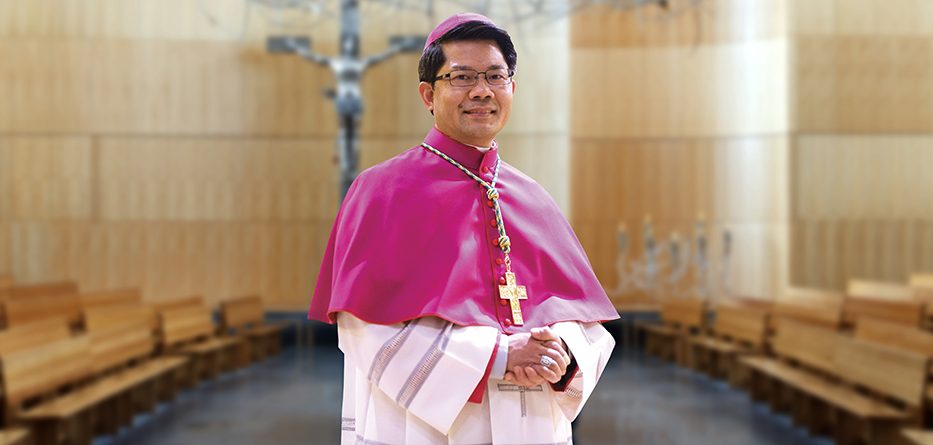Most Reverend Vincent Long Van Nguyen OFM Conv DD STL, Bishop of Parramatta
Homily for the Solemnity of the Epiphany of the Lord in Year B with the First Profession of Sister Teresa Bui Thanh Tam and Perpetual Profession of Sister Maria Doan Thanh Thao of the Missionary Sisters of the Blessed Virgin Mary, Queen of the World at St Patrick’s Cathedral, Parramatta
7 January 2018
Dear friends,
“Life is like a box of chocolates and you never know what you are going to get.” That saying made famous by the film Forrest Gump suggests life is a mysterious journey and we must be ready for surprises. We may not be able to dictate how our lives unfold. But when we are open to be formed by the journey, even those parts that remain unknown to us, we can facilitate the grace of our own transformation. When we are open to the stirrings of the Spirit from deep within, like Elijah hearing God’s voice in the gentle breeze, we can be led to surprising places.
Today we celebrate the Feast of Epiphany which is God revealing himself in a way that surprises, challenges, enlightens and transforms us. In ancient times, the revelation of Jesus’ divinity breaking through to all the world was seen in not only the visit of the Magi, but in Jesus’ baptism and the Wedding at Cana. These are pivotal moments where Christ shatters preconceptions and expectations to reveal God in new ways to new peoples. Indeed, these moments of divine rupture have taken place throughout human history, if only we are open and responsive to them.
Isaiah is one of the prophets who are able to recognise the moments of divine rupture at the critical juncture in Jewish history. As the exiles return to their devastated homeland, they are exhausted, confused and demoralised. Isaiah, however, re-energises them with a vision of a new Jerusalem. It will be much more than the Jerusalem of the good old days. Isaiah speaks of a Messianic Age where Jerusalem will be a light to all the nations and a house for all the peoples. At the height of Jewish monarchy, Solomon built a golden temple as a monument to himself and vassal states had to pay tributes to him. It was a system of monopoly and oppression. The old Jerusalem was elitist and exclusionary. The new Jerusalem that Isaiah speaks about has God, not Solomon, in charge. It points to a wondrous future filled with justice, integrity, joy and hope for all. Isaiah enables God’s people to grasp the hidden meanings of their journey into and out of exile.
His words also enlighten and challenge us as we seek to understand and to live the meaning of our experience in the Church and in the world. In so many ways, we feel like the Jewish exiles facing the monumental task of rebuilding from the ground up after the devastation of the clerical sexual abuse crisis. The future of the Church, like the new Jerusalem Isaiah speaks of, will not be revitalised by way of simply repeating what was done in the past. It will not be simply a restoration project or doing the old things better. Rather, we must have the courage to do new things; we must be open to the Spirit leading us to new horizons even as we tend to revert to the old ways.
This is also the thrust of the Magi story. In embarking on a long and assiduous journey that brought them to many unknown destinations, the three kings were true pilgrims: always open to new learnings, attentive to hidden meanings and ready to be challenged by new horizons. They learn to discover the God they were not looking for: the God of the poor and rejected; the God not of the palace but of the squalor; the God who breaks through boundaries of race, culture and social status.
Dear friends,
Today, we witness the religious profession of Sr Teresa and Sr Maria. Like the Magi, they have embarked on a journey of vulnerable trust. Their vowed life of poverty, chastity and obedience is not so much a denial of their human needs as a means to radical discipleship. The vows enable them to embody more fully the boundary crossing spirit of Jesus and to witness to the “more” of life and the mystery of the God of love often manifested in unfamiliar places and people. The God who formed them in their mother’s womb continues to guide them, at times off the beaten track and into a great unknown. And yet, if we are sensitive to his nudging and willing to go into the deep, he will make us into his instruments. The star over us is ever calling us to march forward with courage, to break loose from our comfort and security to a life open to the kingdom vision of integrity, solidarity and justice for all.
In envisioning a messianic future of God’s chosen people beyond the exile, Isaiah encourages them to walk into new horizons. The revelation of God in Jesus also commits those who are participants in the mystery to open themselves to the divine rupture. Thus our celebration today calls us to embrace not the certitudes of the past but the insecurity of vulnerable trust. In many ways, we follow the footsteps of God’s people and those of the Magi. We are called to walk out of our set boundaries into God’s expansive horizons. Let us pray that guided by a future to unfold before us, we may not be afraid to embrace the unknown pathways of faith, hope and love. May God of the journey accompany and form us into his people and his instruments for the transformation of the world.








